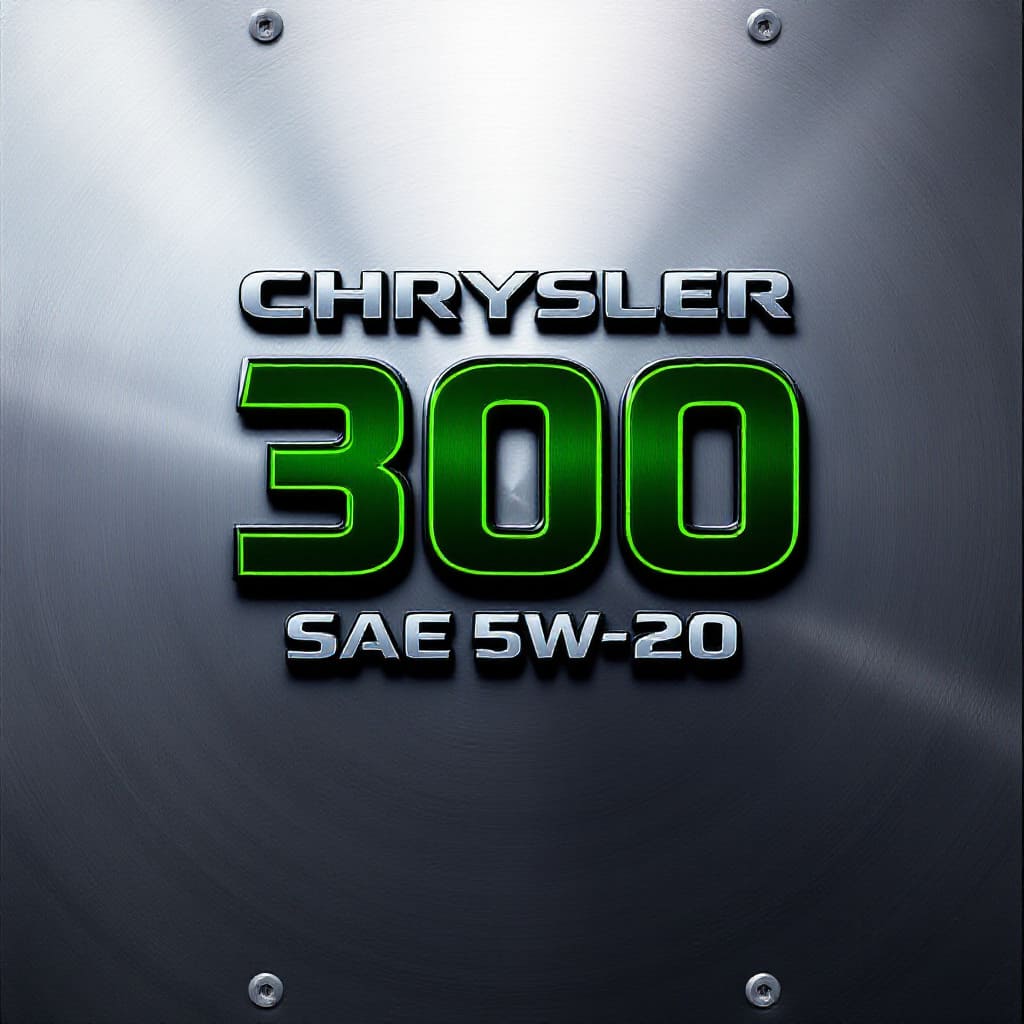Engine oil choice is more than routine maintenance for the Chrysler 300—it defines how well the V6 or V8 will withstand heat, load, and time. Every specification, from Chrysler’s MS-6395 approval to torque values on the drain plug, ties directly into durability and compliance.
This guide goes beyond generic advice by connecting Chrysler’s published requirements with industry tests such as HTHS viscosity (ASTM D4683), oxidation stability (Sequence IIIH), and volatility control (ASTM D5800). By grounding oil selection in measurable standards, it equips owners with a reference built for accuracy, not guesswork.
For the serious reader, what follows is not a sales pitch but a technical roadmap. It explains how the right SAE 5W-20 oil, filter choice, and service intervals ensure the Chrysler 300 operates at peak efficiency—protecting both performance and longevity well into the future.
Key Specifications
The engine options available for the 2019 model include a 3.6-liter V6 and an optional 5.7-liter V8. Each configuration has its own oil capacity requirements.
For the V6 engine, the system holds approximately 5.9 quarts when the filter is included. For the V8 engine, the total is about 7 quarts with the filter in place.
Drain plug torque specification for the Chrysler 300 is set at 20 ft-lbs (27 N·m), and replacing the crush washer at each service helps ensure a proper seal. Following this specification prevents leaks and protects the oil pan threads during routine maintenance.
The recommended oil viscosity across both engine types is SAE 5W-20, ensuring reliable lubrication under a wide range of driving and temperature conditions.
Specs are what matter—as long as the oil meets Chrysler’s MS-6395 requirement, your warranty protection stands. The Magnuson–Moss FTC ruling makes it clear: no dealer can force you into a brand unless they supply it for free. “Don’t let anyone sell you fear when the law already has your back.”
Chrysler MS-6395 specification is the formal standard that all engine oils must meet to maintain warranty compliance for the Chrysler 300. Oils carrying this approval ensure compatibility with FCA requirements, covering performance, durability, and emissions system protection.
Oil filter specifications play a direct role in engine protection, with OEM and aftermarket options differing in efficiency ratings and construction quality. Using the correct filter type and part number ensures proper flow, contaminant capture, and long-term durability for the Chrysler 300’s lubrication system
Mobil 1 Extended Performance High Mileage Full Synthetic Motor Oil 5W-20 is formulated for vehicles that have surpassed 75,000 miles. It is an advanced full synthetic oil engineered to provide long-lasting performance.
The oil change interval with this product can extend up to 20,000 miles between services, making it a durable choice for drivers seeking fewer maintenance interruptions.
Engine performance remains stable even under severe driving conditions, ensuring reliable operation in demanding environments. The formulation is designed to withstand stress without compromising protection.
High-temperature protection is a critical factor for oil stability, as elevated heat can cause thinning and deposit formation. Synthetic 5W-20 oils maintain viscosity more effectively under these conditions than conventional oils, ensuring reliable lubrication for the Chrysler 300 during demanding operation.
Sludge removal is another strength, as the oil is capable of cleaning deposits in as little as one change. With these properties, it remains fully compatible with the Chrysler 300.
Lucas Oil API SP High Mileage 5W-20 is a synthetic blend created from API Group II and Group III base oils. Its balanced formulation combines strength and stability, making it a reliable option for older engines.
The additive package includes detergents, dispersants, antioxidants, and corrosion inhibitors. These elements work together to maintain cleanliness and resist chemical breakdown throughout the oil’s service life.
Performance is maintained by preserving viscosity from the start of its use to the end of the interval. The blend is engineered to meet both API SP and ILSAC GF-6 standards, ensuring compliance with modern industry requirements.
Protection benefits are extensive, including clean pistons, controlled oxidation, minimized sludge buildup, and reliable timing chain defense. The formulation also supports improved fuel economy.
Seal protection is emphasized, making the oil especially effective for high-mileage engines. With these attributes, it remains an excellent fit for the Chrysler 300.
AMSOIL 5W-20 100% Synthetic High-Mileage Motor Oil is formulated for vehicles that have accumulated more than 75,000 miles. It is designed to extend engine life by addressing the needs of aging components.
The detergent package is boosted, combining strong detergents and dispersants to keep internal parts clean. This formulation works continuously to minimize buildup throughout the oil’s service life.
Anti-wear additives are included to deliver enhanced protection against friction and component damage. This helps maintain reliable operation under various driving conditions.
Sludge reduction is a key benefit, with testing showing a 67% decrease in deposits, leading to noticeably cleaner engine internals. This improvement contributes to more efficient performance.
The longevity guarantee allows coverage for up to 12,000 miles or one year of protection. As an API-licensed product, it meets recognized performance standards and serves as an excellent option for the Chrysler 300.
Synthetic vs. Conventional Oils: A Straightforward Comparison
Synthetic oils differ from conventional oils because they are engineered with a consistent molecular structure. This uniformity provides smoother operation and greater reliability compared to the irregular composition of conventional oils.
High-temperature high-shear viscosity measures how oil holds its film when heat rises and metal grinds under load. ASTM D4683 fixes the pressure and speed, showing whether a 5W-20 can stand its ground. The result is not theory but a line of defense against wear.
“That kind of rigor is what separates a serviceable oil from one that keeps an engine sharp past 100,000 miles.”

Fuel dilution in short-trip driving happens when oil never reaches full operating temperature, leaving traces of gasoline in the crankcase. The 2019 Chrysler 300’s port-injected engines are far less prone to this than GDI designs, so while minor dilution can occur with repeated cold starts or short commutes, it is not a persistent risk in normal use.
Volatility loss at high temperature is measured by the ASTM D5800 Noack test, which determines how much oil evaporates under heat. Lower volatility means less oil consumption and helps maintain the correct balance of additives, keeping the Chrysler 300’s engine protected during extended driving.
Fuel economy performance is validated through the Sequence VIE and VIF tests, which measure how much efficiency improvement an oil delivers compared to a reference baseline. Results from these standardized benchmarks confirm whether a 5W-20 oil provides measurable mileage gains in engines like the Chrysler 300.
Camshaft and valvetrain wear are evaluated through the Sequence IVA test, which measures how well an oil protects critical moving parts under boundary-lubrication conditions. Strong results in this test confirm that a 5W-20 oil can reduce metal-to-metal contact and extend durability in the Chrysler 300’s engine.
“Ignore these standards, and you’re gambling with wear you’ll never see until it’s too late.”
Cold-weather performance is a critical aspect of SAE 5W-20 oils, as the grade is designed to remain fluid enough for reliable starts in freezing conditions. While Chrysler does not publish ASTM D5293 or D4684 test data for the 300, oils meeting the SAE viscosity standard ensure sufficient pumpability and lubrication protection during winter operation..
Timing chain wear protection is especially important for the 3.6L Pentastar V6, which has a history of chain wear concerns under extended use. Oils tested under API SP and OEM-specific standards help limit elongation and surface wear, while the 5.7L HEMI V8 is less affected by this issue but still benefits from proper lubrication.
Oxidation stability under heat is measured with the Sequence IIIH test, which evaluates how oil resists thickening and deposit formation when exposed to extended high-temperature operation. A 5W-20 oil that performs well in this test ensures the Chrysler 300’s engine remains clean and protected during sustained highway driving or heavy-load conditions.
Phosphorus retention over time is a key factor in protecting catalytic converters, since phosphorus loss from volatile oils can shorten emissions system life. Chrysler’s MS-6395 specification requires oils to control phosphorus volatility, ensuring long-term exhaust system reliability in the Chrysler 300.
Environmental impact is lowered since synthetic oils last longer, reducing both waste oil and emissions associated with frequent changes.
Although synthetic oils cost more initially, the extended service intervals and stronger protection can offset the expense. For Chrysler 300 owners, choosing synthetic oil can significantly enhance both performance and longevity.
Consistency in oil choice matters because mixing brands or blends can turn precision chemistry into a coin toss. One oil builds a film, the other cuts it in half, and suddenly the gamble isn’t about mileage but about parts you can’t see. “That’s how quiet wear turns into loud bills.”
Oil change intervals should be respected to ensure this performance continues over time. With synthetic oils, most owners can safely extend service to between 7,500 and 10,000 miles, though the manufacturer’s guidelines remain the final authority for exact schedules.
Chrysler’s oil life monitor uses driving data such as trip length, engine load, and temperature to calculate when an oil change is due. This system provides a more accurate service interval than mileage alone, helping Chrysler 300 owners maintain protection without unnecessary oil changes.
Consistency in oil choice is essential, since mixing brands or formulations can weaken protective qualities and compromise performance. Sticking with one proven oil helps preserve both efficiency and longevity in the Chrysler 300.
Conclusion
Choosing the right oil type for your Chrysler 300 is essential for maintaining optimal performance and longevity. While high-quality synthetic oils can often extend service intervals to 7,500–10,000 miles, Chrysler’s official guidance calls for oil changes every 6,000 miles or 6 months under severe duty conditions, so owners should follow the schedule that best matches their driving habits.
Here’s how oil really breaks down—Tier One is the bargain stuff built to meet only the minimum, it works but won’t hold up under stress. Tier Two is the middle ground, blends and mid-grade formulas that handle daily duty but aren’t built for long pushes. Tier Three is where the premium full synthetics sit, the ones tested to stay stable when heat, load, and time pile on. “Once you see the tiers, you stop guessing and start choosing with intent.”
For more details on high-performance motor oils, explore: Lucas Oil Synthetic Blend High Mileage HERE, Mobil 1 Extended Performance High Mileage HERE, and AMSOIL 5W-20 High Mileage HERE.
